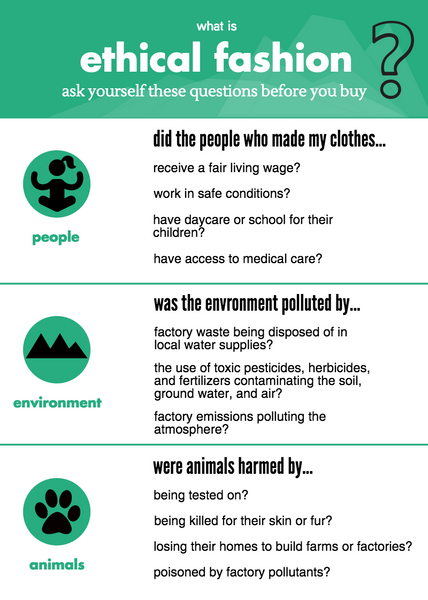We hear the terms ethical, sustainable, socially conscious, and transparent thrown around a lot today. But, what do they really mean? Often used interchangeably, they all do not mean the same thing.
When asked ‘what is ethical fashion?’ the first thing people usually think of is the conditions and treatment of the people making the clothes. But, ethical fashion is more than that. It’s also about the direct impacts to the local environment - the people, animals, and plants who live in the area and do not necessarily work at the factory or mill but, are still impacted by it. The ethical treatment of workers and the local community.
The ethical treatment of workers and the local community.

For a company to create an ethically sourced and produced product all workers throughout the entire supply chain should be paid fair wages. They should all work in a safe environment, and in conditions that do not jeopardize their health. Companies that really care about their people take this a step further, they often offer daycare and schooling to factory workers children, medical and health insurance benefits, and other charities and programs that give back to the local community. Their business practices should not negatively impact the local community, like, for example taking away jobs from local people.
The ethical treatment of the environment and its resources.

Ethical companies minimize their impact on the environment. And generally, they follow sustainable practices in their design decisions. They research and take into account the effects of all components that make a product and choose ways to reduce their environmental impact. For example, environmentally ethical products should not use pesticides, herbicides, or fertilizers which contaminate soil, groundwater, and the atmosphere. They should not use azo or heavy metal poisonous dyes which often end up in water supplies and can make people and animals in the area sick. Waste water should be cleaned and treated as to not pollute the local water reserves, and air pollutants and emissions should be kept to a minimum, filtered, or neutralized before being released into the air.The ethical treatment of animals.
The ethical treatment of animals.

Ethically made clothing should not kill animals for their skins or furs. The also should not test on animals. The ethical treatment of animals also includes the indigenous wild animals in the area. These animals should not be poisoned by factory waste, or lose their homes because of clothing production.Other things ethical companies do.
Other things ethical companies do.
Ethical companies usually not only provide jobs for women but, have a focus on creating safe workplaces for them, they will give back to local communities in a way the community needs (not in a way that will generate the best press), and they raise awareness and create a community for the causes they believe in.
In the next two weeks, we will continue to explore what sustainable and transparent fashion mean. If you have questions or thoughts on the topic please share them with us in the comments section!


2 comments
Lots of mazel in your new venture! i know you have the talent and strenghth to make it happen. I’m rooting for you!!!!
Very informative.
Leave a comment